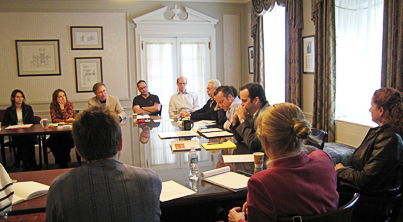This page traces the evolution of legal education at McGill, identifying the factors that lead to the development of the Transsystemic Program. It presents a timeline of pedagogical changes at the Faculty with comments from Professors Daniel Jutras and Roderick A. MacDonald, who were both instrumental in bringing about the Transsystemic Program.
Timeline of the McGill Program
1848 - Founding of the McGill Faculty of Law
McGill was the first university in Canada to offer a degree in law. The Faculty offered a civil law degree where the courses, with very few exceptions, were all taught in English.
1968 - The establishment of the National Program
The National Program was formally established at the Faculty under the leadership of Dean Maxwell Cohen who wanted to create a bilingual and bijuridical curriculum.

The National Program was offered by the Faculty from 1968 to 1999. Initially, the new program allowed students to complete their education in three years: obtaining a civil law degree, with the option of remaining another year to complete a common law degree. In 1985 the program was reformed. It henceforth integrated Canada’s European legal traditions, so that the common law and the civil law were taught comparatively and sequentially. Like other law faculties, students began by studying Contracts, Civil Liability/Torts and Property in one legal tradition. Following this, they would study the same subjects in the other legal tradition.
Under the National Program students could choose to obtain either civil law or common degrees, or both.
"Yet, neither the initial curriculum established in 1968, nor its second generation model put into place in the early 1970s, nor even its third generation model of the 1980s, was a fully bilingual and intellectually integrated, polyjural four-year tuition rooted in a universalist model of legal education."
-Prof. Roderick A. Macdonald in The National Law Programme at McGill: Origins, Establishment, Prospects (1990) 13 Dalhousie Law Journal 211.
1984 - Rethinking the National Program
Within the Faculty, many believed that the program was not responding to student’s needs, and feared difficulties attracting future students. During the deanship of Professor Roderick A. MacDonald, a concerted effort was made on renewing the Faculty staff, and reflecting upon the structure of the National Program.
"One of the key problems with the National Program was that there was labeling and branding. Students who entered in one stream would become attached to that tradition and reject the other tradition. Because of this it became necessary to establish one single admissions pool with one single stream."
-Prof. Daniel Jutras
1994 - Establishment of the Curriculum Review Committee
An ad hoc Curriculum Review Committee was established to study possible reforms to the National Program.
"The "McGill Programme"...is meant to reflect the vision of our Faculty of Law. It builds on our strengths and attempts to underline them even more clearly. The Programme is meant to encourage and promote the talents, enthusiasm, abilities and commitment of our diverse students and faculty members. Finally, the Programme is meant to embody a legal education that is specifically situated here in Montréal, Québec, and Canada, and at the same time, is aware of the broader economic, political and legal environments in which it unfolds."
-Final Report of the Ad Hoc Curriculum Review Commitee. April '96
1997 - Approval of the Transsystemic Program
Under the leadership of Dean Stephen Toope, the faculty council approved the proposal to adopt a new Transsystemic Program on November 28, 1997. Under this program, students would obtain what could only properly be called a “double degree” in common and civil law.
1999 - Implementation of McGill’s Integrated Program
McGill's Integrated Program welcomed its first cohort in 1999.
Many of the courses now on offer take an integrated, transsystemic approach that combines both legal traditions in one class. For their first year, McGill law students learn about contracts through an integrated course called Contractual Obligations, and about civil wrongs through an integrated course called Extra-Contractual Obligations/Torts. Consciously abandoning traditional attachments to jurisdictions and individual traditions, these courses focus on the development of legal intellect, on how to approach fundamental juridical problems which transcend traditions and legal systems. Other, upper year courses are also inspired by the transsystemic pedagogical method, including those in legal history and legal methodology.
"Transsystemia is different, it is about identifying functions, structures, problems and issues and then identifying appropriate legal solutions"
-Prof. Daniel Jutras
The McGill Program is bilingual. While practical considerations prevent every course from being instructed in both languages, all required courses are. Students are assigned readings such as cases and doctrine in both languages regardless of the primary language of instruction.
The legal education offered through the McGill Program prepares students for many different jurisdictions and legal contexts. McGill law students become cosmopolitan jurists equipped to face the complexities of transnational legal practice.
2009 - The tenth anniversary of the transsystemic program
In May of 2008, the Centre instigated a discussion on the future of transsystemia. The meeting gave professors an opportunity to consider how the program can continue to evolve, for example by integrating transsystemic content into public law courses.

During this workshop, Professor Jean-Guy Belley presented his progress towards completing a transsystemic book on contract law.
"To be truly transsystemic, the program must evolve to become multilingual, multijurisdictional and multidisciplinary."
- Prof. Roderick A. Macdonald
